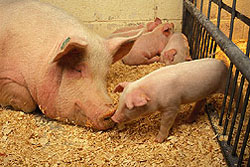



Pig Stress Syndrome Linked to Gene Defect
US - A defect in a gene called dystrophin is the cause of a newly discovered stress syndrome in pigs, US Department of Agriculture (USDA) scientists have found.
Stress-related issues like transportation cost the US swine industry an estimated $50 million a year. Producers as well as researchers have long suspected that undetected stress-related syndromes are affecting the health and well-being of pigs.
This notion was confirmed when scientists at the Agricultural Research Service (ARS) Roman L. Hruska US Meat Animal Research Center (USMARC) in Clay Center, Nebraska, discovered a stress syndrome in two 3-month-old male siblings that died after being transported from one facility to another. The novel syndrome is different than the classical porcine stress syndrome, which was eliminated from US swine herds years ago.
Molecular biologist Dan Nonneman and his colleagues in the USMARC Reproduction Research Unit mapped the stress disorder to a genetic mutation in dystrophin. Mutations in dystrophin, which cause DMD—Duchenne muscular dystrophy—are associated with muscle weakness that can lead to death.
To map the disease, scientists re-mated the original parents of the affected siblings to produce additional litters. The 250 offspring, which included 49 affected piglets, were genotyped, and one chromosomal region containing the dystrophin gene was associated with the syndrome.
Piglets affected by the syndrome had an abnormal heart rate when treated with an anesthesia and monitored. The heart rate of unaffected pigs undergoing the same treatments remained steady.
Animals with the stress condition had half as much dystrophin protein as their unaffected siblings. Pigs suspected of having the syndrome also had three times as much creatine phosphokinase, an enzyme used to monitor heart and muscle diseases.
The gene is located on the X chromosome, and the syndrome is found primarily in males that inherit the affected X chromosome from their mother. Animals seem more susceptible at two months of age, a time when piglets are transported from nursery to grower facilities.






